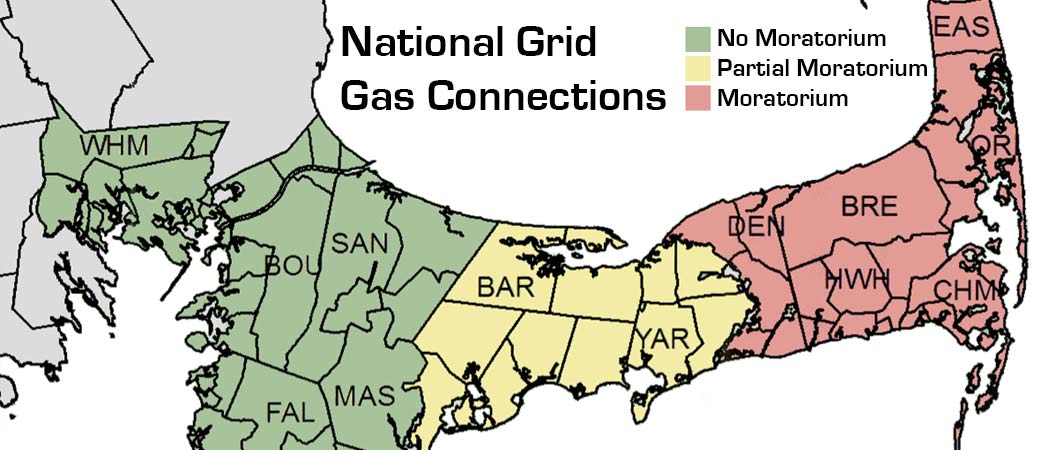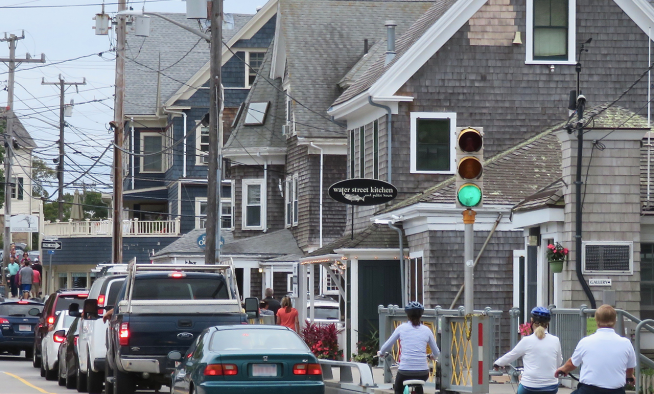Commission commits to expedited permitting for National Grid
 Following the decision by National Grid to halt new natural gas connections between Dennis and Eastham, the Cape Cod Commission committed to an expedited permitting process. The Commission also expects to take a lead role in facilitating communication.
Following the decision by National Grid to halt new natural gas connections between Dennis and Eastham, the Cape Cod Commission committed to an expedited permitting process. The Commission also expects to take a lead role in facilitating communication.
National Grid’s announcement followed more than nine months of assessment and replacement of critical connections and pipeline welds. In the end, the company determined that the only safe way to restore adequate capacity to the lower Cape is replacement of 21 miles of pipe. Pressure in the pipeline was reduced to ensure safety, but also limits the ability to supply enough natural gas to meet more than existing demands. National Grid estimated it could take five to seven years for such a replacement to be completed.
“We’re looking at the critical planning tools at our disposal to consolidate regulatory reviews and expedite permitting,” Commission Executive Director Paul Niedzwiecki said. “A five- to seven-year delay in new gas connections creates an unacceptable hardship to economic development opportunities. We can do better.”
The Commission will convene a taskforce of industry professionals, as well as local, regional and state officials to follow and assist in the process. The Commission will provide the task force with technical and communications assistance as necessary.
The situation highlights the need for a comprehensive approach to regional capital planning at all levels, which is a focus of the five-year Regional Policy Plan update initiated by the Commission in early December. The immediate priority is restoration of new gas connections through expedited planning, permitting and construction of a new gas pipeline.
The Commission participated in a Dec. 9 meeting with National Grid, the Cape Cod Chamber of Commerce, members of the Cape’s Legislative delegation and representatives from the Cape’s building and real estate communities. Among other sentiments expressed at the meeting was a desire for all parties to work together to shorten the pipeline replacement timeline.
Those attending the meeting also asked that National Grid maintain open communications with elected officials, government entities and affected industries, especially with respect to the timeline.
National Grid’s supply pipeline extends from the canal to Eastham. Outer Cape towns currently have no access to natural gas and rely on other fuel and energy sources.
Among the concerns during the moratorium period is National Grid’s winter demand contingency, which calls for connection of liquefied natural gas trucks in Chatham and Eastham to maintain adequate system pressure.
The pipeline project approved by the Commission in February 2013 was the second of a three-part pipeline reinforcement program for the western portion of Cape Cod started under the pipeline’s previous owner in 2005. That 4.4-mile segment was reviewed as a Development of Regional Impact (DRI) and approved by the Commission in February 2013. The pipeline deficiencies related to the connection moratorium were first discovered by National Grid in January 2014 for more-easterly segments not considered in the earlier decision.
FACTS
- January 2014 – As a result of a leak report, a substandard connection (200psi to 60psi) was discovered and corrected
- June 2014 – further investigation uncovers 30 substandard connections that are corrected, but also finds issues welds in the 21-mile distribution mainline from Yarmouth east to Brewster and to the edge of Chatham
- The 21-mile mainline (first run in 1964) was originally designed for 99psi, but at some point the pressure was increased to 200psi
- The welds on the mainline do not meet current standards for 200psi so the mainline pressure was brought down to 125psi
- The initial plan was to fix the issues with the mainline to allow it to return to 200psi, but replacement of the entire 21-mile mainline was required.
- The 125psi operating pressure reduces winter peak day capacity, which prompted National Grid’s sales moratorium.
- No new service connection or added load will be allowed in the red areas on the map and applications would be reviewed on a case-by-case basis in the yellow areas on the map
- The NGID Winter Contingency Plan will be in effect using LNG tanks in Chatham and Eastham as needed to maintain pressure
- Applications filed by October 1, 2014 will be honored, but no new connections or loads after that.
Related Posts




